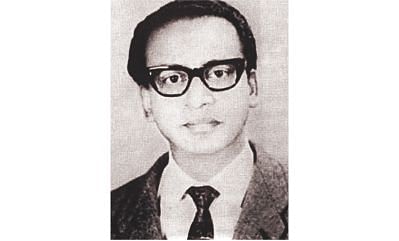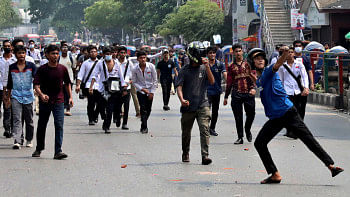Remembering Shahid Altaf Mahmud

Shahid Altaf Mahmud is widely known for his composition of the song “Amar Bhai-er Rokte Rangano Ekushey February”, which has become the unofficial anthem of the International Mother Language Day (February 21). This composition, along with others, has given him a unique position in the hearts of Bangladeshis.
Mahmud's house served as a hiding place for arms caches and he provided food and money to Freedom Fighters during the Liberation War. During a combing operation (in August, 1971) in Dhaka city by the Pakistan army, Mahmud was arrested along with his brothers-in-law and a friend. He was tortured and believed to be killed in September. Mahmud is regarded among the Martyred Intellectuals.
A talented painter as well as composer, Mahmud wrote and composed many patriotic songs which were played by the Shadhin Bangla Betar Kendra during the Liberation War. His composition was used in the movie “Jibon Theke Neya” and other popular Bangladeshi movies. Some of his notable creations include “Satyer Joi”, “Bolo Bir” and “Ami Manusher Bhai Spartacus”.
Mahmud was born in Patarchar village under Barisal district on December 23 in 1933. He finished his matriculation from Barisal Zilla School. He gained admission to BM College before he went to Calcutta (now Kolkata) to study painting at the Calcutta Arts School. Mahmud started singing when he was in school. He received his first music lessons from famed violinist Suren Roy. He learnt to sing Gano Sangeet (inspirational songs) that earned him popularity at that time.
Mahmud came to Dhaka in 1950 and joined Dhumketu Shilpi Shongho. Later he became the music director of the organisation. In 1956, Mahmud was invited to Vienna Peace Conference. But he was unable to attend as his passport was confiscated by the government in Karachi. There he stayed until 1963 and took taalim in classical music from Ustad Abdul Kader Khan. After returning from Karachi to Dhaka, Mahmud worked in 19 films: along with the famous “Jibon Theke Neya”, he also worked in films like “Kaise Kahu”, “Kar Bou”, and “Tanha”. He was also worked with political and cultural organisations.
During the 1950s he sang Gano Sangeet in many places to inspire activists of the Language Movement. Along with his singing, Mahmud continued to support the movement.
Mahmud took part in the Bangladesh Liberation War in 1971. He created a secret camp inside his house for the freedom fighters. But as the secret leaked out, the Pakistan Army captured him on August 30, 1971.
To keep his memories alive, Shahid Altaf Mahmud Foundation was established in 2005 at the personal initiative of the martyr's family. The foundation annually confers the Shahid Altaf Mahmud Padak to eminent personalities. From 2005 onwards, seven personalities -- actor Dr. Enamul Haque, singer Bipul Bhattacharya, music exponent Sudhin Das, music director Alam Khan, veteran actor Razzak, Nazrul exponent Professor Rafiqul Islam and noted singer Sabina Yasmin -- have received this award, according to Altaf Mahmud's daughter Shawan Mahmud. The award winner receives Taka 10,000 and a crest. The foundation has also launched a website: www.shahidaltafmahmud.com.
Mahmud was (posthumously) awarded the Ekushey Padak in 1977 for his contributions to Bengali culture and the Bangladesh Liberation War. In 2004, he was also conferred the Independence Award for his special contribution to Bengali culture.

 For all latest news, follow The Daily Star's Google News channel.
For all latest news, follow The Daily Star's Google News channel. 



Comments